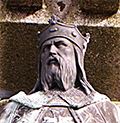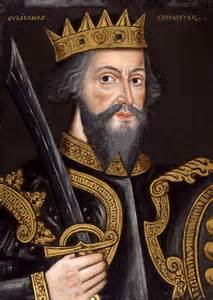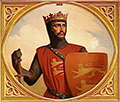Robert I
 Robert I, referred to in some sources as Robert the Magnificent, was born on June 22, 1000. He grew up in the royal household and coveted power. When he got it, he inherited his brother's struggles against a number of increasingly powerful nobles. Robert chose to pick another fight, with his uncle Robert, who was Archbishop of Rouen. Duke drove archbishop into exile. As a result, Robert found himself and all of Normandy excommunicated; this order was lifted only after Duke Robert allowed Archbishop Robert to return.
Robert I, referred to in some sources as Robert the Magnificent, was born on June 22, 1000. He grew up in the royal household and coveted power. When he got it, he inherited his brother's struggles against a number of increasingly powerful nobles. Robert chose to pick another fight, with his uncle Robert, who was Archbishop of Rouen. Duke drove archbishop into exile. As a result, Robert found himself and all of Normandy excommunicated; this order was lifted only after Duke Robert allowed Archbishop Robert to return.
In yet another realm of conflict, Robert got involved in a dispute in Flanders, between father and son, Baldwin IV and Baldwin V. Son had ousted father, but Robert's support of Baldwin IV convinced Baldwin V to make peace.
Robert had had a son named William but was not married to William's mother. Thus was William an illegitimate son. Robert went on a pilgrimage to Jerusalem and never returned. He died on July 2, 1035, at Nicaea. William succeeded him as Duke of Normandy.
William the Conqueror
William proved astute militarily from an early age. A powerful presence on the battlefield and at court, William paid a state visit to England in 1051. William later claimed that during this visit, the English king at the time, Edward the Confessor, promised William the English throne. (The two knew each other from a previous interaction, when William served as guardian to Edward and his brother Alfred when the two youngsters were living in Normandy to avoid Canute's Danish invasion of England.) William further claimed that in 1064, Harold Godwinson, a powerful Saxon noble, supported William's claim to the kingship.
Harold was with King Edward when the king died, on January 5, 1066, and Harold reported that Edward had granted the kingship to him, Harold. Hearing of this, William felt aggrieved and set about efforts to take the kingship by force.
 William had been making noises about invading England all year, and Harold had bulked up the defenses in the south, awaiting an invasion. But William took his time, for a variety of reasons, including weather and supply chains, finally putting ashore in late September.
William had been making noises about invading England all year, and Harold had bulked up the defenses in the south, awaiting an invasion. But William took his time, for a variety of reasons, including weather and supply chains, finally putting ashore in late September.
Harold, who had made his reputation as a man of action, especially in his lightning-fast march up to Yorkshire, decided not to wait for William to march his troops to London. It wasn't the four days that the northern journey was, but the movement south was done in relatively quick fashion, including a week or so to solidify the north in the wake of the uprising of his brother, Tostig. This time, however, some of the northern barons and their military compatriots decided to sit out the fighting. Harold gathered weapons and steam as he marched his troops southward, and they arrived in early October in the vicinity, where William and his troops had decided to wait. The two armies met on October 14, 1066. Williams and his army was victorious, Harold was killed during the fighting, and William solidified his hold on the throne by marching to London and proclaiming himself King of England. He was crowned king on Christmas Day 1066 in Westminster Abbey.
Despite all of his efforts to take the throne, however, William found that he missed Normandy enough to go home, leaving his half-brother and another trusted official behind as co-regents. Harold's sons didn't go quietly, leading raids throughout the southern part of England. William had to expend energy and even make some personal appearances to put down this disquiet.
Throughout the countryside, despite all of William's military efforts, confusion still reigned as to population and economy. Sensing an opportunity to maximize tax revenues, William ordered a realm-wide survey of the people and their property. The result of this was Domesday Book, which was finalized in 1086.
The following year, William returned to Normandy to defend those lands against attacks from elsewhere in France. He died in the process, on September 9, 1087. He left Normandy to his oldest son, Robert.
Robert Curthose
William's son Robert became Duke of Normandy when his father died. Robert was just a teenager at this time. In 1063, William named Robert Count of Maine; Robert had been betrothed to Margaret, the heiress to that province, when he was very young. She died before the wedding could take place.
Robert, often referred to as Robert Curthose, revolted against his father in 1077, besieging the castle of Rouen. He was not successful and fled to Flanders, to escape his father's wrath. The two came to blows a few times in the next few years, most notably in 1079, when Robert unhorsed and wounded his father on the field of battle. Matilda, William's queen and Robert's mother, negotiated a peace between father and son that lasted until she died, in 1083.
William had another son, named William, and he divided up his kingdom on his death, granting Robert the Duchy of Normandy and William the Kingdom of England. This was King William Rufus. A third and youngest son, Henry, was given a bunch of money.
Many nobles had lands in both England and Normandy. When William I was king of both areas, the nobles knew whom to serve. Now that the lands were divided, the nobles had divided loyalties. William Rufus didn't help his cause by displaying a penchant for cruelty and greed. He and his chief minister, Ranulf Flambard, levied heavy taxes on the nobles and the Church and pursued fiscal policies that angered the Church, such as diverting funds intended for the clergy into the royal coffers instead. He also banished Anselm, the Archbishop of Clergy, to Normandy.

Many of the nobles threw in their lot with Robert and encouraged an invasion of England, so Robert could follow in his father's footsteps and be king of both England and Normandy. Leading this uprising, known as the Rebellion of 1088, was Bishop Odo of Bayeux, who was the half-brother of William the Conqueror. The nobles hired a mercenary force and went to England; Robert did not appear. William successfully defended England. The following year, William took the fight to Robert and invaded Normandy, forcing his brother to terms very favorable to William.
In 1096, Robert was seized with a fervor to go off to a foreign land and fight. He went off to fight in the First Crusade, the first several attempts by Western forces to take back ownership of the Holy Land from Muslim armies. Robert and William, who had uneasily reconciled, made a pact (which Robert sealed by giving his brother a lot of money, which he got by levying yet another tax on his subjects) that made William regent of Normandy while Robert was away. They agreed that if one of them died without an heir, the other would be ruler of both England and Normandy.
Robert was away on Crusade until September 1100. He returned and resume control of Normandy. However, in England, he found his brother William dead and his brother Henry king. Robert found allies in a handful of English barons and marched at the head of a small force to confront Henry. The two sides did not come to blows; instead, the two brothers agreed to return to the territorial arrangement instituted by their father: Henry renounced his claim to Normandy, and Robert agreed not to press his claim for England.
Robert, meanwhile, had returned from Crusade and decided that he deserved the English crown now that William was dead. Robert found allies in a handful of English barons and marched at the head of a small force to confront Henry. The two sides did not come to blows; instead, the two brothers agreed to return to the territorial arrangement instituted by their father: Henry renounced his claim to Normandy, and Robert agreed not to press his claim for England.
Henry punished the barons who had supported Robert, banishing many of them. One of them, Robert of Bellême, fled to Normandy and tried to convince Robert to try again to take the English throne. Henry responded by invading Normandy, at the head of a force of his own. The result was the Battle of Tinchebray, in 1106. The battle ended in a resounding victory for Henry and life imprisonment for Robert. Robert died on Feb. 10, 1134. Robert's son, William Clito, took up the mantle a couple of times, but Henry put down both revolts, cementing his status as ruler of Normandy.
Next
page > Early Years
> Page 1, 2